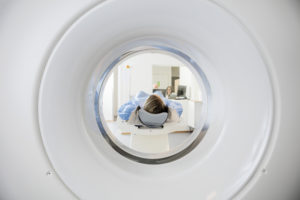Going in for a CT scan can cause a lot of anxiety. You’re already concerned about the outcome, and then you begin to think about the potential risks associated with the test itself. While it’s always best to consult with Southwest Diagnostic Imaging Center about any concerns you may have, here are a few things you should know about radiation and CT scans.
How Does a CT Scan Work?
A computed tomography, or CT, scan is a procedure in which a small x-ray beam is rotated around one’s body, providing a doctor with images that have detailed information. Although very similar to a normal x-ray, a CT scan uses a motor that rotates around the patient while they are on a table. These x-ray beams will shoot through the body, and as they leave they are transmitted to a computer to develop the images.
CT scans are used to diagnose a range of conditions including cancer, blood clots, and more, and can scan very specific sections of the body.
What Are the Risks?
CT scans do use radiation that can cause effects in living tissue, however this level of radiation is monitored very closely. Aside from radiation, which we will dive into shortly, the only other risk is a false positive that may lead to unnecessary follow-up tests. However, this is rare, and your doctor will do ample research to be sure the test is correct.

Radiation Dosage
When having a CT scan, there is exposure to a small amount of radiation. This level of radiation will vary from patient to patient, and will be measured on a scale that is typically based on the body part being examined. The “effective dose” is essentially the measurement that determines how much radiation is concerned a cancer detriment for a particular organ. For example, while a head CT may have an effective dose of two, an abdomen CT may have an effective dose of eight.
In CT scans, a doctor will typically use the lowest dosage possible, and will often not even order one unless absolutely needed. Because of this, the dosage is typically not a concern.
Other Radiation Risk Factors
Risk factors vary from patient to patient and may include things that are not related to radiation. For example, some of the contrast agents use may cause allergic reactions to some individuals. It’s important to discuss all concerns with Southwest Diagnostic Imaging Center before the test.
Those who are pregnant may not receive CT scans for safety purposes, but CT scans do not often pose any risks to the baby if the area being imaged is not near the abdomen or pelvic region. The tests for these areas will often be MRIs or ultrasounds.
If you have multiple CT scans in a short period of time, or start receiving CT scans at a very early age, you may be at higher risk for cancer than others. However, it’s important to note that the risk of naturally occurring cancer is much higher than cancer from radiation due to the dosage being so low.
Should you have any questions or concerns regarding an upcoming CT scan, make sure to contact Southwest Diagnostic Imaging Center. We’re happy to answer anything and make you feel comfortable about your procedure!
As always, if you have any further questions or would like to schedule an appointment, please call (214) 345-6905 or request an appointment online today!

